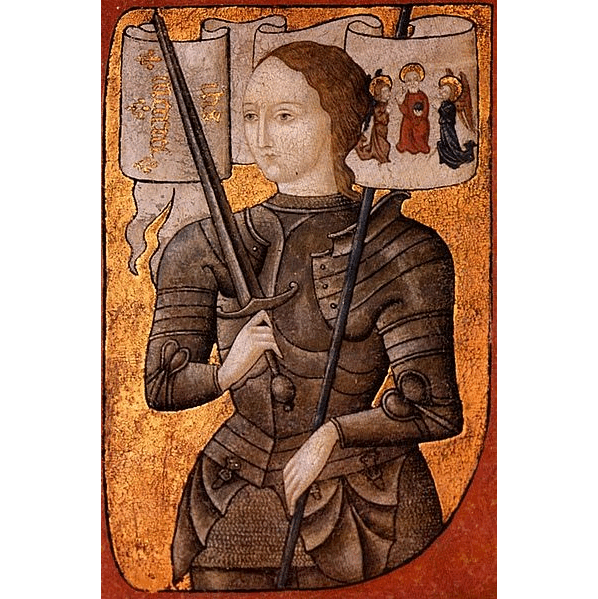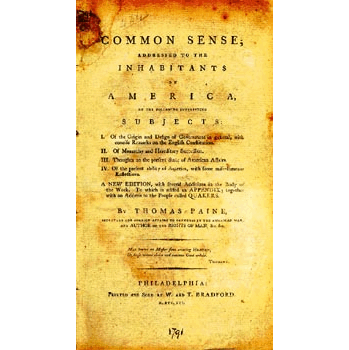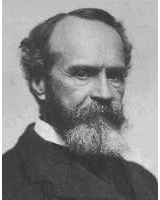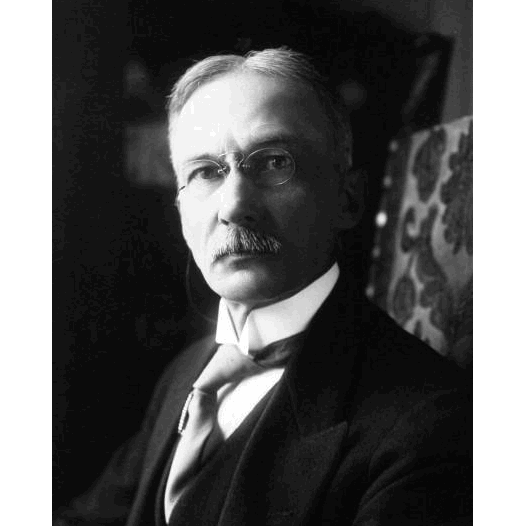The Week in Freethought History (January 6-12)
Here’s your Week in Freethought History: This is more than just a calendar of events or mini-biographies – it’s a reminder that, no matter how isolated and alone we may feel at times, we as freethinkers are neither unique nor alone in the world.
 Last Sunday, January 6, but in 1412, Joan of Arc was born. In the summer of 1425, the adolescent Joan, who never learned to read or write, began to hear voices and see visions. Three years later, the sixteen-year-old believed she had been given a mission to unite France under the dauphin, later King Charles VII. After winning some victories for the French, in May 1430 Joan was captured, abandoned by Charles, sold to the English, and found guilty of heresy by the Inquisition. Joan was burned at the stake as a witch 31 May 1431, at age 19. The basic questions that concern us about Joan are (1) Did she really hear voices? and (2) Was she a witch?
Last Sunday, January 6, but in 1412, Joan of Arc was born. In the summer of 1425, the adolescent Joan, who never learned to read or write, began to hear voices and see visions. Three years later, the sixteen-year-old believed she had been given a mission to unite France under the dauphin, later King Charles VII. After winning some victories for the French, in May 1430 Joan was captured, abandoned by Charles, sold to the English, and found guilty of heresy by the Inquisition. Joan was burned at the stake as a witch 31 May 1431, at age 19. The basic questions that concern us about Joan are (1) Did she really hear voices? and (2) Was she a witch?
No one but Joan said she heard the voices and she admitted them to no one until her trial. While it is impossible to prove that angels did not visit Joan, it is quite a bit more likely that she was the victim of delusions or schizophrenia. Margaret Murray’s speculations on Joan and witchcraft are no longer considered respectable (Witch Cult in Western Europe, 1921), but the old religion was indeed practiced in Europe in Joan’s time. Joan was executed for being a witch, and the transcripts of her trial show her accusers had some evidence of this. Whether supernatural or popular, the English feared her power. Since those who believed Joan a witch and those who believed her a messenger of God subscribed to the same superstitions, it is of little consequence whose side is right.
 Last Monday, January 7, but in 1997, Heidi Fleiss was sentenced to 37 months in prison for cheating on her taxes and laundering prostitution profits. Fleiss spent 21 months in a federal prison in Dublin, California, and was released in 1999. Prostitution, the crime underlying the crime for which Heidi Fleiss was jailed, has been present in every culture and every period of history. Sacred prostitution, at one time practiced by ἱεροδούλη in the temples of Babylon, Canaan, Syria, Phoenicia, Asia Minor, Armenia, Greece and elsewhere, may have derived from the worship of Mother Earth and fertility. But there was always an air of sensuality mixed with profit associated with the practice, even when “higher” motives were professed. Although we don’t know when the Old Testament book of Deuteronomy was written, its condemnation of raising money for the temple by “whores” and “sodomites” (23:17-18) confirms the practice in early Hebrew history.
Last Monday, January 7, but in 1997, Heidi Fleiss was sentenced to 37 months in prison for cheating on her taxes and laundering prostitution profits. Fleiss spent 21 months in a federal prison in Dublin, California, and was released in 1999. Prostitution, the crime underlying the crime for which Heidi Fleiss was jailed, has been present in every culture and every period of history. Sacred prostitution, at one time practiced by ἱεροδούλη in the temples of Babylon, Canaan, Syria, Phoenicia, Asia Minor, Armenia, Greece and elsewhere, may have derived from the worship of Mother Earth and fertility. But there was always an air of sensuality mixed with profit associated with the practice, even when “higher” motives were professed. Although we don’t know when the Old Testament book of Deuteronomy was written, its condemnation of raising money for the temple by “whores” and “sodomites” (23:17-18) confirms the practice in early Hebrew history.
In Christian times, as any secular study of the history of prostitution will tell you, prostitution was no less prevalent, and often far more so, in Europe. Marital infidelity in Ancient Rome was rare in comparison with the general unchastity of medieval Europe, because prostitutes thrived in the classical capital. The Church Fathers and the Councils were hardly taking the front lines to eradicate the profession. In fact, prostitutes flocked to the sides of the Council participants. Three hundred were imported in 1189 to accompany the Crusaders to Palestine, and thousands followed the Sixth Crusade. In medieval Germany, some prostitutes were called “cathedral girls,” which is where they plied their trade. Perhaps we could take a lesson from the medieval popes who licensed and taxed the trade for its revenue.
 Last Tuesday, January 8, but in 1697, Edinburgh University student Thomas Aikenhead was hanged for blasphemy in Scotland. Thomas was born in March 1676 and although orphaned by age 10, in 1693, he found himself studying at Edinburgh University as a 17-year-old medical student. The University library may have been his undoing, because it is clear that Thomas read books by Descartes, Spinoza, Thomas Hobbes and other freethinkers, such as the pantheist Michael Servetus (executed for his opinions in 1553). Thomas was all of 20 years old when he was arrested. His crime, according to the Lord Advocate of the Crown, was irreverence toward the sacred state religion of England and its many sacred elements. According to Leviticus 24:16, “anyone who blasphemes the name of the LORD must be put to death. The entire assembly must stone him.” There is no indication that the injured party – God – appeared to claim injury. The clergy wanted him dead. The law allowed the punishment. God was silent.
Last Tuesday, January 8, but in 1697, Edinburgh University student Thomas Aikenhead was hanged for blasphemy in Scotland. Thomas was born in March 1676 and although orphaned by age 10, in 1693, he found himself studying at Edinburgh University as a 17-year-old medical student. The University library may have been his undoing, because it is clear that Thomas read books by Descartes, Spinoza, Thomas Hobbes and other freethinkers, such as the pantheist Michael Servetus (executed for his opinions in 1553). Thomas was all of 20 years old when he was arrested. His crime, according to the Lord Advocate of the Crown, was irreverence toward the sacred state religion of England and its many sacred elements. According to Leviticus 24:16, “anyone who blasphemes the name of the LORD must be put to death. The entire assembly must stone him.” There is no indication that the injured party – God – appeared to claim injury. The clergy wanted him dead. The law allowed the punishment. God was silent.
The Lord Advocate, impelled by the clergy, “called for blood” and Thomas was ordered hanged – not by the God he insulted, but by human beings with the legal power to do such things. We do not know if god-belief or the Trinity would have long survived the assaults of one agnostic, so Thomas Aikenhead, barely old enough to sign a legal contract, was executed for offending human beings, not any sky god. At least he was the last person to be executed for blasphemy in the Western world.
 Last Wednesday, January 9, but in 1967, popular South African-born American musician Dave Matthews was born. Dave Matthews came to the U.S. at age 18. Since the 1990s the Dave Matthews band has prospered with their unique combination of jazz and rock, and providing music for the films Mr. Deeds (2002) and The Matrix Reloaded (2003). In a June 1998 US Magazine interview, Matthews reflected, “I’m glad some people have that faith. I don’t have that faith. If there is a God, a caring God, then we have to figure he’s done an extraordinary job of making a very cruel world.” Later, in the Boston Globe, the interviewer notes, “He crystallizes his thoughts on God in the rocking ‘What You Are,’ with the verse, ‘Hoping to God on high is like clinging to straws while drowning. … Oh, realize what you are!’” “It would be safe to say that I’m agnostic,” Matthews says. “However, I do feel as though we owe a faith to the world and to ourselves.”
Last Wednesday, January 9, but in 1967, popular South African-born American musician Dave Matthews was born. Dave Matthews came to the U.S. at age 18. Since the 1990s the Dave Matthews band has prospered with their unique combination of jazz and rock, and providing music for the films Mr. Deeds (2002) and The Matrix Reloaded (2003). In a June 1998 US Magazine interview, Matthews reflected, “I’m glad some people have that faith. I don’t have that faith. If there is a God, a caring God, then we have to figure he’s done an extraordinary job of making a very cruel world.” Later, in the Boston Globe, the interviewer notes, “He crystallizes his thoughts on God in the rocking ‘What You Are,’ with the verse, ‘Hoping to God on high is like clinging to straws while drowning. … Oh, realize what you are!’” “It would be safe to say that I’m agnostic,” Matthews says. “However, I do feel as though we owe a faith to the world and to ourselves.”
 Last Thursday, January 10, but in 1776, English-born American citizen Thomas Paine published “Common Sense” – anonymously. His revolutionist pamphlet became so popular that Paine himself was often called “Common Sense.” In effect, Thomas Paine, a Deist who denied the divinity but not the morality of Jesus, made a declaration of independence before Jefferson ever put those words on paper. “Common Sense” argues against the prevailing concept of the divine right of kings – that monarchs derive their authority from God, rather than from the people.
Last Thursday, January 10, but in 1776, English-born American citizen Thomas Paine published “Common Sense” – anonymously. His revolutionist pamphlet became so popular that Paine himself was often called “Common Sense.” In effect, Thomas Paine, a Deist who denied the divinity but not the morality of Jesus, made a declaration of independence before Jefferson ever put those words on paper. “Common Sense” argues against the prevailing concept of the divine right of kings – that monarchs derive their authority from God, rather than from the people.
Paine wrote, “But there is another and greater distinction for which no truly natural or religious reason can be assigned, and that is, the distinction of men into KINGS and SUBJECTS. Male and female are the distinctions of nature, good and bad the distinctions of heaven; but how a race of men came into the world so exalted above the rest, and distinguished like some new species, is worth enquiring into …. A French bastard landing with an armed banditti, and establishing himself king of England against the consent of the natives, is in plain terms a very paltry rascally original. – It certainly hath no divinity in it. … Did it ensure a race of good and wise men it would have the seal of divine authority, but as it opens a door to the foolish, the wicked, and the improper, it hath in it the nature of oppression. …” Expelling God from government was an Enlightenment idea that made the modern world possible. There is no superior age to one in which democracy – rule of the people – thrives. In our day, that’s common sense.
 Yesterday, January 11, but in 1842, American psychologist William James was born. James earned an M.D. degree, taught anatomy and physiology from 1872, and became professor of philosophy and psychology, at Harvard University in 1880, remaining there until 1907. The most significant contribution James made to the science of psychology was ridding it of the metaphysical elements with which it was traditionally tainted. The work for which James is chiefly known is yet another example of his search for transcendental meaning in life, Varieties of Religious Experience (1902). Christian writers swoon over his words, but in several places James expresses profound skepticism: “Religion, in short, is a monumental chapter in the history of human egotism. … Religious experience, in other words, spontaneously and inevitably engenders myths, superstitions, dogmas, creeds, and metaphysical theologies, and criticisms of one set of these by the adherents of another.”
Yesterday, January 11, but in 1842, American psychologist William James was born. James earned an M.D. degree, taught anatomy and physiology from 1872, and became professor of philosophy and psychology, at Harvard University in 1880, remaining there until 1907. The most significant contribution James made to the science of psychology was ridding it of the metaphysical elements with which it was traditionally tainted. The work for which James is chiefly known is yet another example of his search for transcendental meaning in life, Varieties of Religious Experience (1902). Christian writers swoon over his words, but in several places James expresses profound skepticism: “Religion, in short, is a monumental chapter in the history of human egotism. … Religious experience, in other words, spontaneously and inevitably engenders myths, superstitions, dogmas, creeds, and metaphysical theologies, and criticisms of one set of these by the adherents of another.”
In his Ingersoll Lecture, Human Immortality (1908), James says, “my own personal feeling about immortality has never been of the keenest order.” This echoed his sentiment in a 1904 letter: “My personal position is simple. I have no living sense of commerce with a God. I envy those who have, for I know the addition of such a sense would help me immensely. The Divine, for my active life, is limited to abstract concepts which, as ideals, interest and determine me, but do so but faintly, in comparison with what a feeling of God might effect, if I had one. …I have grown so out of Christianity that entanglements therewith on the part of a mystical utterance has to be abstracted from and overcome, before I can listen.” Later in the same work, James muses about the Bible, saying, “It is so human a book that I don’t see how belief in its divine authority can survive the reading of it.”
 Today, January 12, but in 1861, American philosopher and psychologist James Mark Baldwin was born. Baldwin made important contributions to early psychology, psychiatry, and to the theory of evolution. He taught at Toronto, Princeton, Johns Hopkins, and Mexico Universities. He was Herbert Spencer lecturer at Oxford in 1915, and received the Gold Medal of the Danish Academy of Science. Baldwin’s most important theoretical legacy is the concept of the Baldwin effect. His agnosticism is expressed in his Fragments of Philosophy and Science (1903), in which he rejects all religious creeds and accepts God only as “a construction of the imagination” or “the ideal self.” Because he claims this vague objective basis for the idea of God, he escapes being accused of atheism.
Today, January 12, but in 1861, American philosopher and psychologist James Mark Baldwin was born. Baldwin made important contributions to early psychology, psychiatry, and to the theory of evolution. He taught at Toronto, Princeton, Johns Hopkins, and Mexico Universities. He was Herbert Spencer lecturer at Oxford in 1915, and received the Gold Medal of the Danish Academy of Science. Baldwin’s most important theoretical legacy is the concept of the Baldwin effect. His agnosticism is expressed in his Fragments of Philosophy and Science (1903), in which he rejects all religious creeds and accepts God only as “a construction of the imagination” or “the ideal self.” Because he claims this vague objective basis for the idea of God, he escapes being accused of atheism.
Other birthdays and events this week—
January 8: American actress famous for her role as “Prissy” in Gone With the Wind, Thelma “Butterfly” McQueen was born (1911).
January 9: American burlesque-era stripper Gypsy Rose Lee was born (1914).
January 9: French writer and existentialist intellectual Simone de Beauvoir was born (1908).
January 12: American radio personality Howard Stern was born (1954).
We can look back, but the Golden Age of Freethought is now. You can find full versions of these pages in Freethought history at the links in my blog, FreethoughtAlmanac.com.

